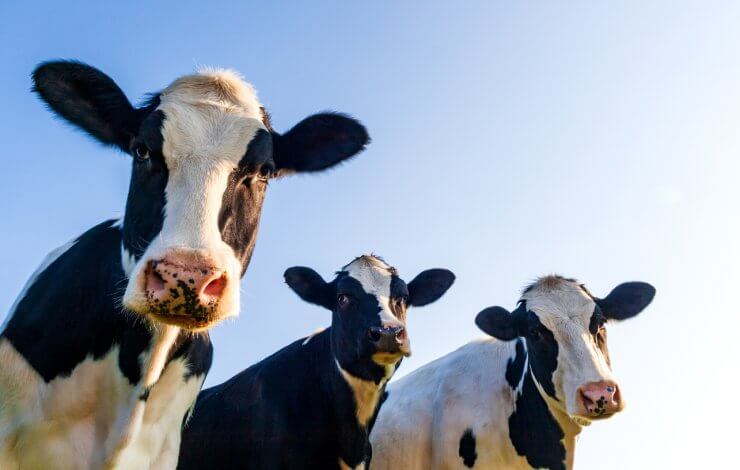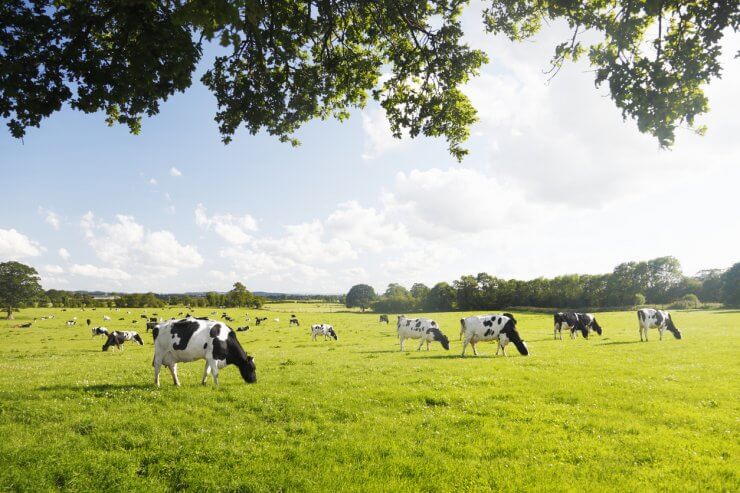
If you’ve ever driven through farm country at the right time, you’re already somewhat familiar with cow manure fertilizer. That’s one of those rare times in life where I think I would appreciate stuffy sinuses!
Despite the “aroma” of cow manure, it has a long history as a fertilizer on commercial farms. It’s full of the nutrients plants need (nitrogen, phosphorous, and potassium), and it helps enrich the soil with calcium, magnesium, and sulfur. And for farmers who also raise cattle, it’s free! Plus, thanks to the unique bovine digestive system, including a stomach with four compartments, cow manure is largely free of weed seeds.
That’s all great if you have acres and acres of farmland and you want to grow tons of corn, but is this realistic for a small backyard garden? Because we all know that poop and food don’t go together so well.

Discover 7 top tips for growing, harvesting, and enjoying tomatoes from your home garden—when you access the FREE guide The Best Way to Grow Tomatoes, right now!
The truth about cow manure fertilizer for your backyard garden
I may have misled you a little bit. While plenty of farms use raw cow manure fertilizer, that’s not the only way to use it. Composted manure has almost no odor at all. So if it’s the odor holding you back, and you’re like, “Amanda, there is no way I’m about to put that smelly stuff outside my kitchen window,” well, you do have an option.
Now then, the question is whether or not it’s safe for your vegetable garden. Because surely these commercial farms have some process that’s not available to most of us that would render the manure free of pathogens? There are some regulations around the practice, but for the most part, it’s not that different than what you’ll do at home, should you decide to use cow manure fertilizer.
Here’s the grey area. Using raw manure as fertilizer is not without its drawbacks. You don’t want poop splashing up on your squash or lettuce. However, if you plan ahead and work carefully or use composted manure, you significantly reduce your chances of spreading pathogens to your delicious veggies.
So if you decide to use raw manure, the process is pretty simple, although it does require advanced preparation. At the end of your gardening season in the fall, mix raw manure into your garden soil and cover it with mulch. This helps eliminate that wonderful odor, but it also helps keep you safe. Giving the raw manure at least four months to break down in the soil can help reduce the possibility of pathogens like E. coli and salmonella being present.
Personally, I prefer composted manure. It doesn’t smell, and it’s significantly less likely to harbor dangerous bacteria. There’s a catch, though. Here’s what the University of New Hampshire extension program has to say about composted manure:
To ensure that pathogens have been killed, the compost pile must reach a high temperature (between 131°F and 140°F) for a sustained period of time (several weeks). The compost must also be turned regularly and carefully monitored so that all of the manure has been exposed to sufficient temperatures.
They go on to point out, however, that most home compost piles don’t meet these requirements. Which brings us back to the original question: Is cow manure fertilizer safe for vegetable gardens? For the most part, yes. If you correctly compost the manure, it can be relatively safe for your vegetable garden.
But always use your best gardening practices, whether you’re adding fresh soil, applying composted manure, or even watering your garden. Even if that soil doesn’t contain pathogens that can harm you, it’s always possible that the soil can spread other bacteria that can harm your plants.
Ultimately, however, we humans have managed to successfully garden for millennia, so there’s hope!
Have you used cow manure as a garden fertilizer? What was your experience like?
Discover 7 top tips for growing, harvesting, and enjoying tomatoes from your home garden—when you access the FREE guide The Best Way to Grow Tomatoes, right now!





I pour a bag of composted manure, or fresh, aged manure,into a garbage pail. Fill to the top with water and stir…compost tea! Water my plants with it all summer long, refilling the water . I’m 81, learned from my late father who had the most fantastic garden and I do to. Time tested!!!
I grew up on a farm … we used only cow manure that was from the previous year in the spring … I don’t know what smell you are referring to but we spread it on the fields which surrounded the house and there was never any real smell … maybe the smell comes from what they feed the cows now … and our gardens both vegetable and flower were beautiful. Now if you want a smelly disgusting watery maure use pig manuer which will make you gag from the smell.
I have used horse manure recently, is this also safe? it doesn’t have much smell
I use composted manure.
What about packaged cow manure and/ or commercial sheep manure? Are they hazardous for carrots and other in-ground crops?
Wash your veges well before using them I always use cow manure
We always had a backyard garden growing up. My dad loved his tomato plants as well as a few other vegetables and a few fruits. We only had a short season in Jersey but Dad only used Cow manure as fertilizer on his plants. They were the best vegetables ever! ♥️
I’ve used horse manure for decades with its higher nutrient content vs cows. Be aware that as non-ruminants, they carry the seeds of what they eat. My practice is to work it in at the end of the season as crops come out and deal with the seedlings as they emerge prior to planting on the late fall and spring as they emerge before planting.
I”ve used it for 60 years!!!!